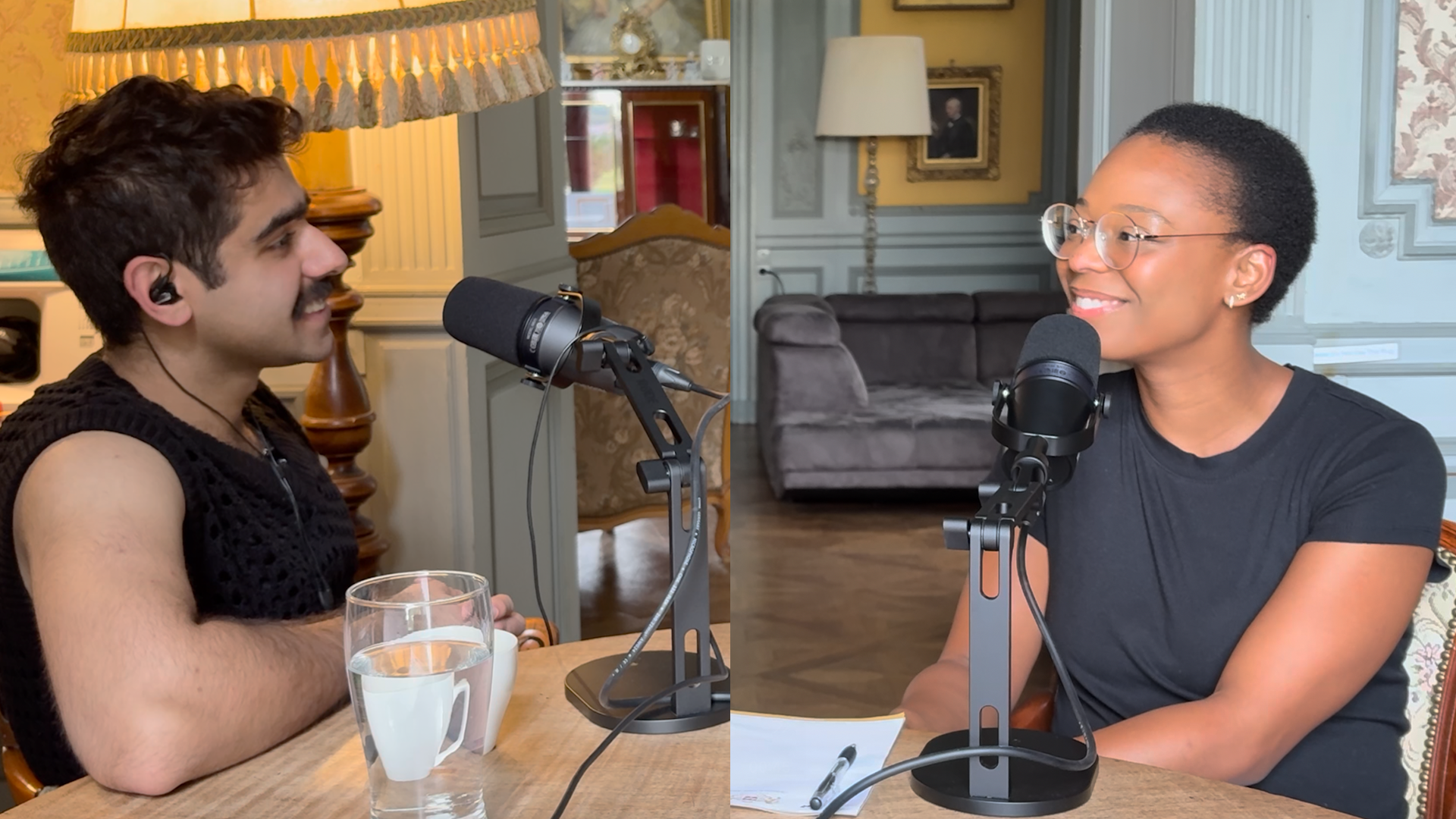
The Apology Tour: Writing Your Way Through Healing, One Co-Living Space at a Time
Jan 29, 2026During our time together at a co-living chateau in Normandy, Tracy and I sat down to talk. She told me about selling her car for cash, breaking her lease, and leaving America with nothing but savings and refused to accept there's only one way to make money. This is the story of how an empty nest, 75-hour work weeks, and pure hustle led to complete reinvention.
The Breaking Point
"I was working two jobs, about 70 hours a week in America. I was a full-time mom to two teenage boys. And I remember thinking, I'm going to die if I keep doing it this way."
Tracy Bellevue had reached her limit. But she couldn't see a way out until the universe made space for her.
Last summer, her two teenage sons decided to move in with their dad. Suddenly, Tracy went from full-time motherhood to haunting the halls of an empty house, working 75 hours a week with no one to care for.
"I was realising that because I was such a young mom, my entire life and identity was wrapped into taking care of others and being a full-time caregiver. At that point, I realised, hey, I really lacked an identity."
Her cousin, also her best friend, was burning out of an Ivy League tech career and planning to escape to Europe for six months.
Tracy's response was immediate: "I'm just going to go with you."
The Hustler's Leap: Selling Everything for Freedom
"I come from a family of immigrants, my family immigrated from Haiti to America. And I think watching my parents' work ethic has taught me that there's a thousand ways to make money. You just have to be willing to get creative and get out there."
Most aspiring nomads ease into the lifestyle. They negotiate remote work arrangements. They build up savings. They test the waters.
Tracy did none of that.
"I quit both jobs, broke my lease, sold my car for cash, cashed out all my savings, and I said, let's go. And I really had no plan. I had no income. I just had my savings."
The hustler mentality, inherited from Haitian immigrant parents, gave her the confidence to leap before the safety net appeared. She knew how to make money work. She just had to be willing to figure it out as she went.
There was one thing driving her forward: a book she needed to write. "I really wanted to write a book. But I knew that I couldn't write that book in America. It was just too close to the memories that I was going to be writing about."
So in August 2024, Tracy and her cousin booked a co-living space in the Swiss Alps and left.
Those First 30 Days: The Crash
The lead-up to departure was chaos. Working double shifts. Wrapping up an entire life. Selling everything. Moving nonstop with very little sleep.
When I asked about those first 30 days, Tracy described the crash landing: "I think right when we got to Switzerland, I kind of crashed. I was so exhausted. I mean, it was like walking into a postcard, but it was also very difficult to go from that kind of movement to complete stillness."
It wasn't the Instagram-perfect start many imagine. It was silent. Reflective. And exactly what she needed.
The Hustler's Playbook: Multiple Income Streams
"You really need to be willing to put yourself out there to make connections, ask for help, and try things you never have before because you never quite know if you're good at something until you jump into it."
When I asked how she makes money as a nomad, Tracy doesn't have a simple answer. She has her hands in many dishes.
Marketing is her primary income. She helps small brands build campaigns, manage Google ads, create strategies from nothing. "I've helped build some brands from nothing. I took a candle-making idea into an entire campaign."
She's also tutored. Tried various projects. Built a Substack blog where she reviews co-living spaces. Subscribers pay a set amount, creating a small but growing passive income stream.
Her philosophy is pragmatic: skills from one field translate to others. "I think you may work in one field, but your skills can apply to many others, and you have to take the chance and try."
The income fluctuates. "There are definitely hard months where the income is not as big as I would like. But then there are some months where I can budget and save and I make a good amount. It really is kind of a make-as-you-go philosophy, but it allows me the freedom to travel in this way. And I think it's worth it."
After a year and a half of nomadic life, Tracy confirms: it absolutely can work. You just have to hustle.
The Book: Writing Through the Darkness
Tracy isn't just travelling to travel. When I asked what brought her to Europe, she revealed she's writing a memoir called The Apology Tour about her years with undiagnosed borderline personality disorder, from age 16 to 24. It's about the relationships she destroyed, the people she hurt, and the person she was before therapy.
The book is structured as a collection of letters to real people in her life, with each chapter dedicated to a different person. "It's called the Apology tour. As someone with borderline personality disorder, I was very bad at relationships of any kind."
"Borderline personality disorder is one that skews your version of reality. And so you constantly are on guard, and you can be very manipulative and very self-centred and narcissistic in some ways. During my period from 16 to 24, I was really just very detrimental to the people around me who were all trying to help me and loved me."
The only relationship she managed to protect during those years was motherhood. "I really prided myself on being a good mother. But outside of that bubble, I was just a monster, to put it lightly."
After therapy and recognising the damage she'd caused, Tracy felt she owed those people vindication. The book is unflinchingly honest. "It's very candid. It's really ugly." The final six chapters focus on family, and their real names will be in the book. She wants them to read it before publication.
But she needed to be in Europe to write it. "The space from America allowed me to write the book, have a peaceful place to write the book in which I wasn't a mother or a sister or something connected to somebody else. I was just Tracy Bellevue."
Finding Community After Isolation
When Tracy left America, she had no close friends. Years of keeping people at arm's length meant she'd built walls around herself.
Europe offered something different: the chance to let people in.
"When I came to Europe, one of the things I wanted to pursue was friendship. Relationships again. Really to let people into my life. And I was very lonely and looking for community."
Co-living spaces became the answer. Meeting people who only knew Tracy Bellevue the person she is today, not the person she used to be.
"It's you can know you're healed and you can believe it, but sometimes it takes having that outside perception to solidify it. I really am aware that I'm not that person anymore."
The distance wasn't running away. It was the final piece of her healing.
Home Is What You Carry
"I am my home as a traveller. I ground myself in myself."
But The Apology Tour can't be finished in Europe. Tracy knows that. "It feels almost cowardly to come here and to publish it here, knowing that maybe they would never see it. I need those people to read their chapters, and I hope that that helps them in some way. Those people deserve that."
When I asked about going home eventually, Tracy described the tension: "When I go home, it's everyone's lives have continued on without you, and they are also different. Nothing feels home anymore."
Tracy's resolution is both simple and profound: she carries home within herself now.
"We are the bridges between our homes, our past lives, those realities that keep going even though we're not there. And this life. We are the travellers in between, the ones who carry the stories of both places."
The Hustler's Lessons
Jump before you're ready. Tracy had no clients, no remote job, just savings and determination. She figured out the income streams along the way.
Diversify everything. Marketing, tutoring, Substack, brand building. Multiple income streams mean you're never dependent on one source.
Your immigrant hustle is an advantage. The willingness to get creative, try new things, and refuse to accept there's only one way makes all the difference.
Distance creates perspective. Sometimes you can't heal or create in the place where the wound happened.
Community matters. Co-living spaces offer connection with people on similar journeys.
Home becomes portable. When everything external is constantly changing, you learn to ground yourself internally.
Still Hustling
Today, Tracy continues splitting her time between European co-living spaces, building her travel brand Bellevue Abroad, working on multiple income streams, and finishing The Apology Tour, the memoir that brought her across the Atlantic.
As our conversation wrapped up, it was clear she knows she'll return to America in December to find the right book agent and publisher.
But for now, she's exactly where she needs to be: hustling her way through Europe, one co-living space at a time, proving that with enough resourcefulness and determination, you really can build a life on your own terms.
For Tracy Bellevue, freedom isn't just about geography. It's about refusing to accept that there's only one way to live, one way to make money, one way to be.
It's the hustler's creed: there are a thousand ways. You just have to be willing to find them.
Take some time to read some of Ibi's other blogs



